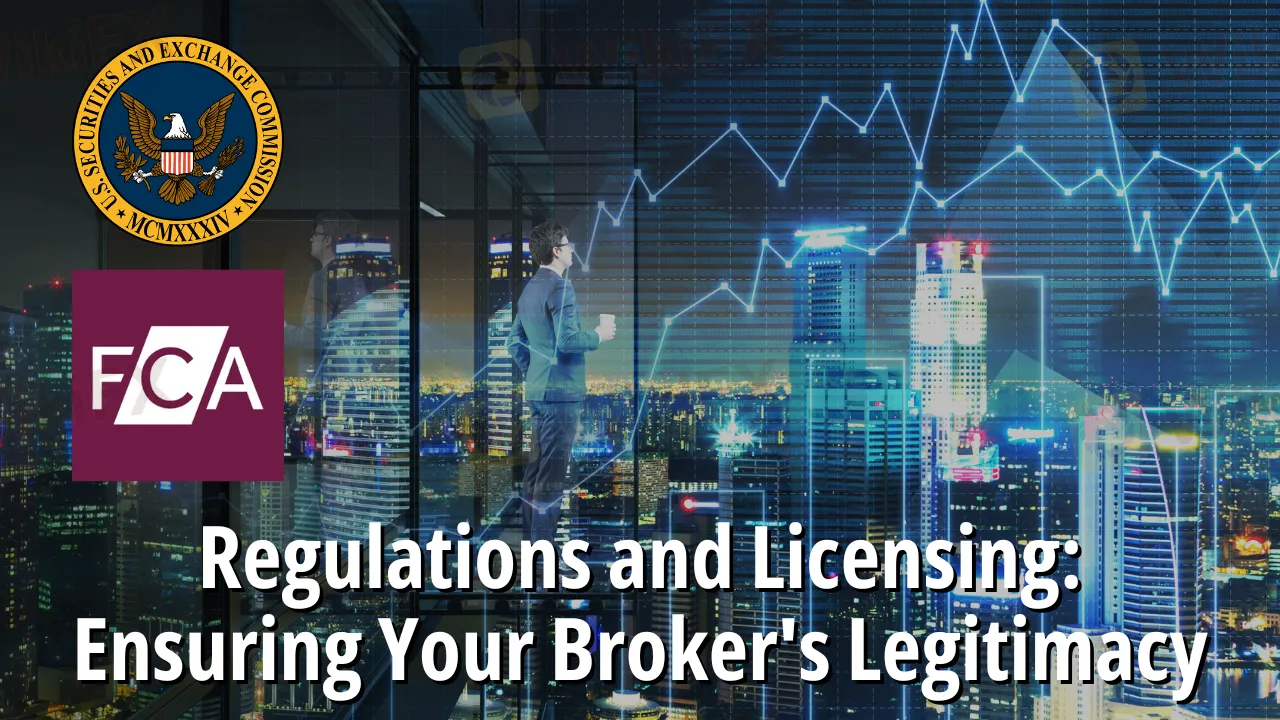简体中文
繁體中文
English
Pусский
日本語
ภาษาไทย
Tiếng Việt
Bahasa Indonesia
Español
हिन्दी
Filippiiniläinen
Français
Deutsch
Português
Türkçe
한국어
العربية
Regulations and Licensing: Ensuring Your Broker's Legitimacy
Abstract:Learn how Forex regulations protect traders from scams. Discover key steps to ensure you choose a legitimate broker. Stay safe in the world's largest market.

Introduction
Forex trading, also known as foreign exchange trading, is the act of purchasing and selling currencies for profit. It is the world's biggest and most liquid market, with billions of dollars exchanged every day. Forex trading is vulnerable to scams and fraudulent operations due to its decentralized structure. This is where rules come into play, to maintain the market's legality and fairness.
Regulators establish rules and standards to control financial markets, including the currency market. These rules are intended to safeguard investors, preserve market integrity, and prevent fraud. Regulations are especially crucial in the forex market owing to its worldwide scope and the participation of various parties, including brokers, dealers, and financial institutions.
One of the primary reasons why forex trading laws are required is to safeguard investors from fraudulent operations. Forex scams may take many forms, including phony investment offers, Ponzi schemes, and unregulated brokers that engage in unethical conduct. Regulations aid in the prevention of such fraud by forcing forex brokers to achieve specific criteria and standards before operating in the market.

The Securities and Exchange Commission (SEC) in the United States and the Financial Conduct Authority (FCA) in the United Kingdom play critical roles in monitoring the currency market. These agencies have the power to license forex brokers and supervise their operations to guarantee regulatory compliance. Licensed brokers must follow tight requirements, including isolating client money from their own in order to safeguard clients in the event of bankruptcy or insolvency.
Furthermore, rules aid in the preservation of market integrity by encouraging openness and fair trade practices. Brokers, for example, are obligated to offer accurate and timely information to their customers, such as price, execution procedures, and possible trading hazards. This openness guarantees that traders may make educated judgments since they have access to credible information.
Brokerage Fraud Case Study
The Federal Securities and Exchange Commission (SEC) charged a registered investment advising company and its owner with fraud. Family Endowment Partners and its owner, Lee Dana Weiss, were accused by the agency of, among other things, encouraging customers to make specific investments without revealing that Weiss would take half of the earnings. The SEC further said that customers were persuaded to invest $40 million in securities produced by entities in which Weiss had financial interests and received compensation.

Steps and ways to protect yourself from unscrupulous brokers
Research, Research, Research
- Check Regulatory Compliance: Different countries have specific regulatory bodies overseeing forex and financial activities. Registration ensures that the broker operates under legal guidelines. Regular checks for compliance updates help spot any malpractices early on.
- Review Broker Histories: Websites that provide broker reviews typically offer a platform for traders to share their experiences. By analyzing both positive and negative feedback, one can get a holistic view of the broker's operations.
- Beware of Too-Good-to-Be-True Offers: Unrealistic profit promises often precede major losses. Always question such offers and compare them with industry norms.
Understand Their Business Model
Different brokers have different operational models. Market makers might set bids and ask prices themselves, while ECN brokers connect traders with major liquidity providers. Knowing the difference helps in understanding the broker's interests and potential conflict points.
Analyze the Trading Platform
The platform is your primary tool for trading. Ensure it's robust and not prone to sudden crashes. Moreover, check if the platform offers real-time accurate data, as manipulated price feeds can lead to significant losses.
Check Their Contact Information
Reliable brokers maintain open communication lines with their clients. The presence of a physical office provides an added layer of trust. It's a place you can potentially visit or at least know exists in case of disputes.
Transparency in Fees and Costs
Hidden fees can eat into your profits. Make sure you're aware of all costs associated with trading, including spreads, overnight fees, and commission percentages.
Initial Deposit and Withdrawal Procedures
A trustworthy broker facilitates smooth financial transactions. Withdrawals, especially, should be hassle-free. If a broker continually finds excuses to delay or deny your withdrawals, it's a strong warning sign.
Training and Educational Resources
A broker invested in its clients' success often provides educational materials. These can range from basic trading tutorials to advanced market analysis. Such resources showcase the broker's commitment to its clients.
Stay Updated on Common Scams
As with any industry, scam techniques evolve. By staying updated on current scam tactics, you fortify yourself against new threats.
Keep Personal Data Secure
Online security is paramount. Ensure that your broker uses strong encryption protocols. Two-factor authentication, where available, adds an extra layer of security.
Be Skeptical
A cautious approach, especially in finance, pays off. Even when dealing with established brokers, always keep an eye out for changes in behavior or terms of service.
Stay Educated
The forex market is vast and continually changing. Continuous learning not only improves your trading skills but also helps you discern the difference between genuine opportunities and fraudulent schemes.
Seek Recommendations
Personal endorsements carry weight. If someone you trust has had a positive experience with a broker, it's a good starting point. However, always conduct your own research to ensure that the broker aligns with your trading needs and style.

By thoroughly understanding and practicing each of these steps, traders can significantly reduce the risk of falling victim to fraudulent brokers and ensure a safer trading environment.
Furthermore, laws aid in the prevention of market manipulation and insider trading. Regulators, for example, examine trading operations to spot any suspicious patterns or odd price fluctuations that may indicate manipulation. Regulators prohibit people and corporations from participating in unfair actions that might undermine the market's integrity by enforcing strong fines and repercussions for such conduct.
Another critical part of forex trading rules is the safety of customer cash. Client money must be kept in separate accounts, known as segregated accounts, for regulated brokers. This separation guarantees that customer money is not mixed with that of the broker, lowering the danger of theft or abuse. Client money can be readily recognized and repaid in the event of a dispute or bankruptcy.
Furthermore, rules address the problem of leverage, which is widespread in forex trading. Leverage enables traders to handle greater holdings in the market with less cash. Excessive leverage, on the other hand, may magnify both earnings and losses, making it a dangerous investment. Leverage restrictions are imposed by regulatory organizations to safeguard traders from excessive risk-taking and to guarantee that brokers do not encourage reckless trading conduct.
It is worth noting that rules might differ across countries. For forex brokers, each regulatory agency may have its own set of regulations and standards. As a result, traders must choose a registered broker that operates in their country and adheres to local legislation.
In conclusion
Regulations and licensing play a vital role in ensuring the legitimacy and integrity of the forex trading market. Forex trading, as a global and decentralized market, is susceptible to various scams and fraudulent activities, making regulatory oversight essential to safeguard investors and maintain market fairness.
Regulatory bodies such as the SEC in the United States and the FCA in the United Kingdom are instrumental in overseeing the forex market. They license brokers and enforce compliance with strict standards, ensuring that traders' funds are protected and that brokers operate transparently.
Scan the QR code below to install the WikiFX App on your smartphone and stay updated on the latest news.

Disclaimer:
The views in this article only represent the author's personal views, and do not constitute investment advice on this platform. This platform does not guarantee the accuracy, completeness and timeliness of the information in the article, and will not be liable for any loss caused by the use of or reliance on the information in the article.
Related broker
Read more

Shocking! Trump to Double Tariffs on Canada!
Trump announced a tariff hike on Canadian steel and aluminum to 50%, shaking the markets. The Canadian stock market took a hit, the Canadian dollar plummeted, and U.S. steel and aluminum stocks surged, triggering strong reactions from all sides.

Good News for Nigeria's Stock Market: Big Gains for Investors!
Nigeria’s stock market kicked off the trading week with strong momentum, boosting investor assets by ₦52 billion. Market confidence is high, creating a rare investment boom!

Why Is OKX Crypto Exchange Under EU Probe After Bybit $1.5B Heist?
Why is OKX crypto exchange probed by EU after Bybit’s $1.5B heist? Explore MiCA’s role, OKX’s Web3 service, and crypto security challenges.

Coinbase Launches 24/7 Bitcoin and Ethereum Futures Trading
Coinbase introduces 24/7 Bitcoin and Ethereum futures trading for U.S. traders, offering perpetual futures contracts with CFTC approval.
WikiFX Broker
Latest News
Plunging Oil Prices Spark Market Fears
Celebrate Ramadan 2025 with WelTrade & YAMarkets
WikiFX App Version 3.6.4 Release Announcement
Indian Watchdog Approves Coinbase Registration in India
SILEGX: Is This a New Scammer on the Block?
How Can Fintech Help You Make Money?
Good News for Nigeria's Stock Market: Big Gains for Investors!
IIFL Capital Faces SEBI's Regulatory Warning
Why Is OKX Crypto Exchange Under EU Probe After Bybit $1.5B Heist?
Gold Trading Insights: Prepare for Moves Above $2,900 Post-CPI
Currency Calculator






